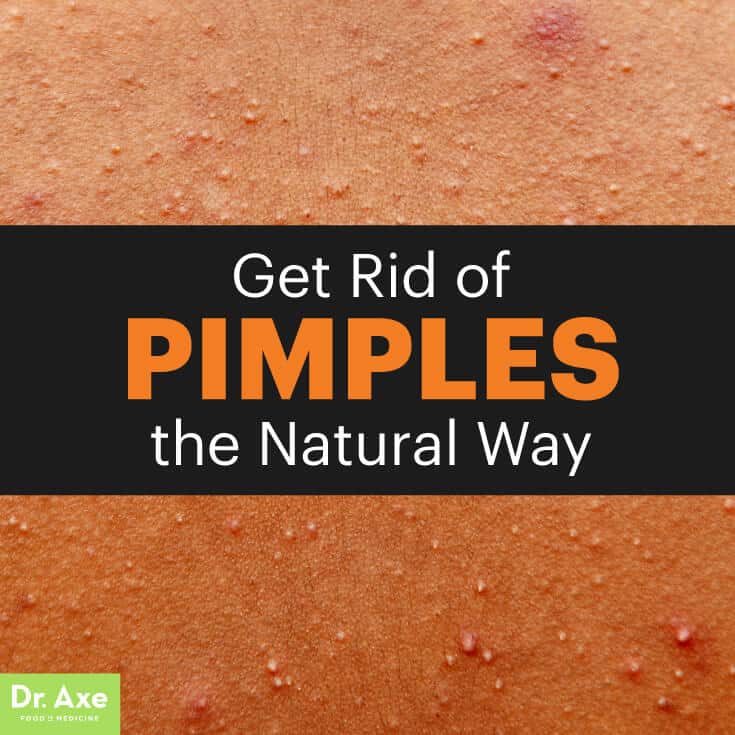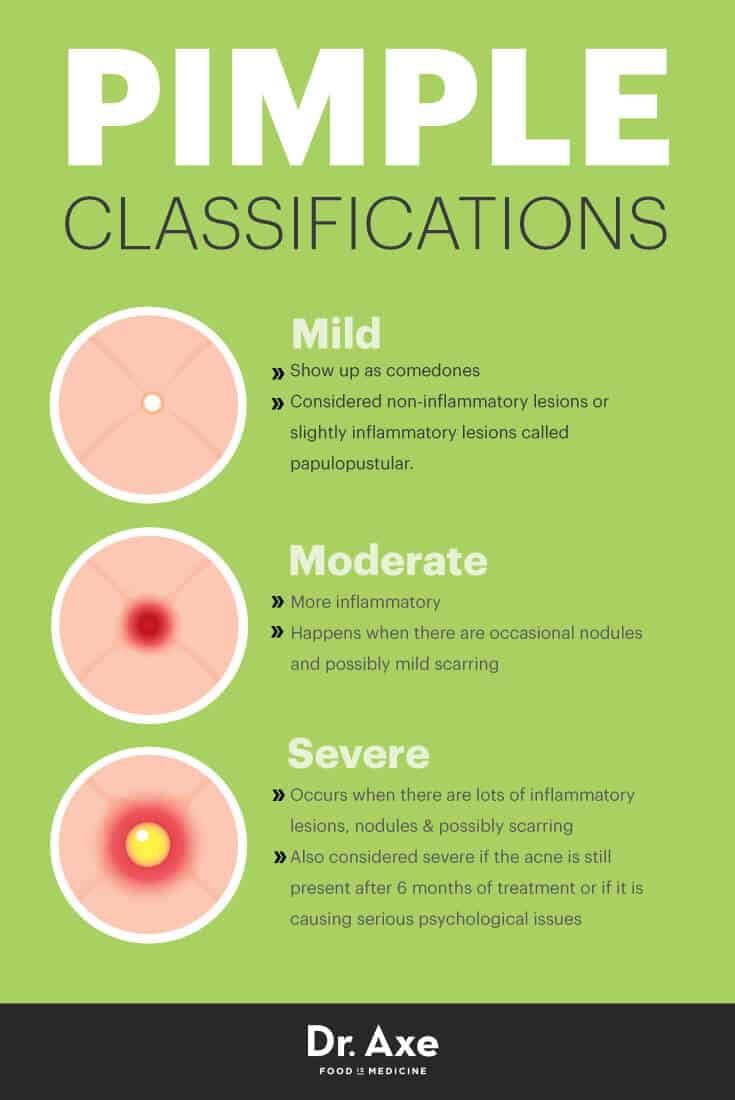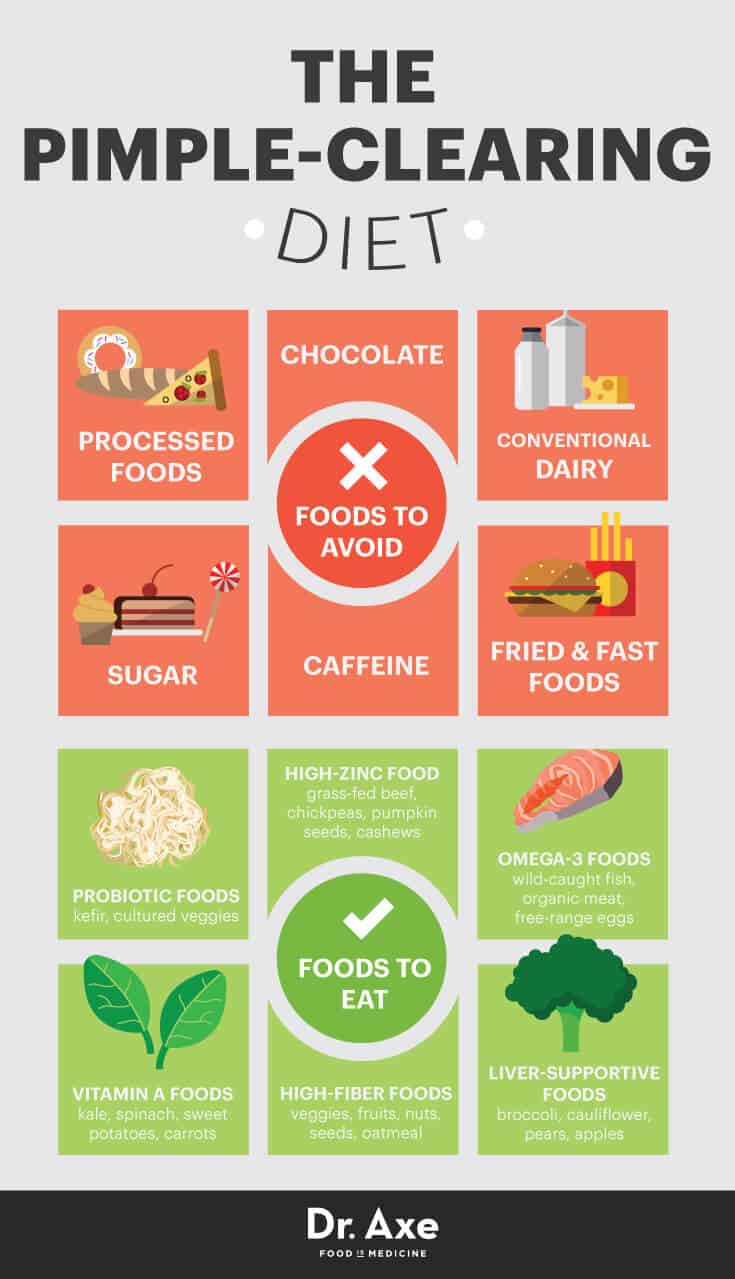How to Get Rid of Pimple on Back
This Dr. Axe content is medically reviewed or fact checked to ensure factually accurate information.
With strict editorial sourcing guidelines, we only link to academic research institutions, reputable media sites and, when research is available, medically peer-reviewed studies. Note that the numbers in parentheses (1, 2, etc.) are clickable links to these studies.
The information in our articles is NOT intended to replace a one-on-one relationship with a qualified health care professional and is not intended as medical advice.
This article is based on scientific evidence, written by experts and fact checked by our trained editorial staff. Note that the numbers in parentheses (1, 2, etc.) are clickable links to medically peer-reviewed studies.
Our team includes licensed nutritionists and dietitians, certified health education specialists, as well as certified strength and conditioning specialists, personal trainers and corrective exercise specialists. Our team aims to be not only thorough with its research, but also objective and unbiased.
The information in our articles is NOT intended to replace a one-on-one relationship with a qualified health care professional and is not intended as medical advice.
How to Get Rid of Pimples
August 15, 2016
(9)

One of the most annoying and embarrassing blemishes everyone has to do deal with at some point in time is the pimple. The most common skin condition in America, acne, often called zits, seems to pop up out of nowhere. However, there are all-natural ways for how to get rid of pimples, including home remedies for acne that really work.
That's good news because theBritish Medical Journalreports that acne affects more than 80 percent of teenagers and continues in adult life in 3 percent of men and 12 percent of women. In fact, it seems to be increasing, which could be due to autoimmune disease, leaky gut syndrome or allergies, for example. Hormonal factors may play a role in breakouts as well. (1)
Essentially, just about everyone deals with pimples at one point or another. Let's take a closer look at acne and the best ways for how to get rid of pimples naturally.
What Are Pimples?
What is a pimple in the first place? A pimple is a small comedone, pustule or papule that forms a skin lesion; the more technical term is acne vulgaris. There are numerous causes, but regardless of the cause, pimples develop when the sebaceous glands (oil glands) get clogged and infected from bacteria. This is why pimples swell up and become red, pus-filled lesions on the surface, and just under the surface, of the skin. (2)
Most experience acne on the face area, but the neck, chest, upper back and shoulders are commonly affected as well. Acne can cause scarring and and even psychological distress, especially in teenagers who are already stressed about acceptance with their peers and their schoolwork.
While the most common lesions of acne include comedones, inflammatory papules and pustules, scarring may be the result of more severe acne involving nodules and cysts. About 30 percent of teenagers have acne that's considered severe. (3) For some, genetics is the cause and beyond their control. (4)
If not treated, acne can cause scarring. Scarring is more likely when the skin is inflamed, swollen, reddish and painful, such as cystic acne and nodules. This form of acne penetrates deep into the skin, causing damage. Delaying treatment can cause scarring too.
While it's best to treat the acne, picking at it makes it worse because it doesn't get the healing time it requires, which ultimately increases inflammation, and therefore, risks of scarring. Also, waiting to treat acne until it becomes severe can lead to extensive scarring, so it's best to treat it sooner than later. (5)
Acne is usually classified as mild, moderate or severe. Mild acne includes the comedones, which are considered non-inflammatory lesions or slightly inflammatory lesions called papulopustular.
Acne that's more inflammatory is denoted as moderate acne. This happens when there are occasional nodules and possibly mild scarring. Severe acne occurs when there are a lot of inflammatory lesions, nodules and possibly scarring. It's also considered severe if the acne is still present after six months of treatment or if it causes serious psychological issues.
Related: How to Get Rid of Nodular Acne

Conventional Pimple Treatment and Why You Should Avoid It
There are many convention ways doctors and dermatologists use for how to get rid of pimples, but many of these convention options come with adverse side effects.
Isotretinoin is a standard prescription that you can get from your doctor. You may have heard of the brand names Absorica®, Accutane®, Amnesteem®, Claravis®, Myorisan®, Sotret® and Zenatane™. CBS News reports that Accutane has some pretty serious side effects, possibly even death. One man reported severe inflammatory bowel disorder that required removal of his colon. It's been noted that it can cause miscarriage, birth defects, increased internal skull pressure, bone mineral density problems, depression, psychosis, suicide, aggressive or violent behaviors, acute pancreatitis, cardiovascular issues, deafness, hepatitis, bowel disease, excessive bone growth, night blindness and sight loss. (6)
Harvard shared information regarding isotretinoin, noting that even though the drug shows dramatic results in a short period of time, it's been shown to "destroy lives." In fact, Harvard reported that about 25 percent of babies who have been exposed to Accutane while in the womb have serious deformities and develop learning disabilities. (7)
Another drug that has presented many concerns is minocycline. Though it's a more convenient — albeit expensive — treatment than some, the risks, including two reported deaths, outweigh that convenience. (8)
So if you're wondering how to get rid of pimples and ask your doctor the same, make sure to try the following all-natural ways for how to get rid of pimples first.
How to Get Rid of Pimples Naturally: Lifestyle Factors
1. Get Enough Sleep
Yes, the phrase, "get your beauty rest" is actually good advice. Stress is one of the biggest causes of acne, and sleep is one of the best natural stress relievers around.
When we sleep, healing happens, and at the same time, it's a great time to apply a home remedy and let it get it to work on eliminating toxins that can cause acne. The Psychiatric Clinics of North America reports that stress is a factor affecting all organs. Though it's easy to forget, the skin is an organ. In fact, it's your largest organ! Getting plenty of rest can help reduce acne-associated stress. (9)
2. Change Your Diet
Eliminating sugar, drinking plenty of water and getting your omega-3 foods can make a difference. Too much sugar can cause insulin spikes, which can create inflammation in the skin and clog up the pores. Water, conversely, hydrates, and it seems we cannot get enough of it. Make sure to get at least half your bodyweight in ounces every day.
Hydrated skin provides the right moisture and balance the skin needs to thrive. Additionally, water helps flush out toxins, something we need on a daily basis. And those omega-3s are pretty awesome at providing a reduction in inflammation. Wild-caught salmon is one of my favorite sources, in addition to sardines, walnuts, flaxseed oil and almonds. (10)
3. Get Daily Exercise
Exercise not only helps you with fitness, but it can help reduce acne-prone skin irritations. That's right, add its use on how to get rid of pimples to the list of exercise benefits. Exercise offers stress relief while getting the blood circulating. This blood-pumping activity sends oxygen to your skin cells, which helps remove dead cells from the body.
4. Cleanse and Exfoliate
Clean skin is a pretty obvious need for an acne-free face and body. You want to make sure you use the right cleansing methods and exfoliate gently. I always look for pure options, such as Castile soap. Castile soap offers a gentle way to cleanse using plant-based ingredients, such as olive oil. (11)
To mildly exfoliate, consider combining local or Manuka honey, which is highly antibacterial, with a small amount of coffee grounds. Follow it up with one of the other options for how to get rid of pimples I list below. (12)
How to Get Rid of Pimples: Natural Remedies
The American Academy of Dermatology states that it's important to treat acne, even though you may often hear that you need to let it "run its course." The problem with that is that dark spots and permanent scars can develop on the skin. Additionally, clear skin can positively affect one's self esteem.
There are many natural treatments for how to get rid of pimples and some that may resolve those unsightly pimples overnight, such as essential oils for acne that you can use right at home. (13)
Here are some of my favorite natural remedies for how to get rid of pimples:
1. Tea Tree Oil
Tea tree oil , also known as melaleuca, is one of my favorite and most recommended remedies for acne because it has amazing microbial properties that help fight the bacteria causes acne. A study published in theAustralasian Journal of Dermatology revealed that tea tree oil provides positive results for mild acne with no serious adverse effects. The study asked participants to apply tea tree oil to the affected area of the face twice a day for three months with assessments conducted at four, eight and 12 weeks of use. The acne was reduced, making tea tree oil a great choice for how to get rid of pimples. (14)
By blending it with a little coconut oil, then applying to the face and affected areas, you may be able to reduce and even eliminate acne in a short period of time. You may find great results with my honey and tea tree oil face wash recipe.
2. Rosemary Essential Oil
Rosemary oil has been around for years and used topically for acne and inflamed skin. (15)A Chinese study concluded that rosemary essential oil helps decrease acne due to its antibacterial effects. To better understand the effects, the study increased the concentration of the rosemary essential oil, resulting in severely damaged bacterial bodies. Treated bacteria eventually led to bacterial death. (16)
3. Coconut Oil
It's no surprise that coconut oil may help since it's so useful in just about anything. But there is a reason for this. Coconut oil contains properties that encourage the elimination of bacteria, which is why there are so many uses of coconut oil for skin. Lauric acid is the main ingredient in coconut oil, and this acid that makes it an effective treatment against acne because it provides antibacterial results. (17)
4. Apricot Seed Oil
Apricot seeds may be a great option for how to get rid of pimples. A recent study published in Phytotherapy Research notes that the phytonutrients and antimicrobial qualities of apricot essential oil obtained from apricot seeds may help provide glowing skin. Apricot essential oil showed antimicrobial activity against a range of bacteria and yeasts that were tested, indicating its possible benefits to prevent and minimize acne. (18)

5. Frankincense Essential Oil
Frankincense oil is a personal favorite for me and my wife, Chelsea. Containing antibacterial and anti-inflammatory properties, it's amazing for almost all skin types and perfect for acne-prone skin. Frankincense invites new cell growth, which can help reduce the appearance of scars. It also helps prevent or eliminate bacteria, part of what can cause acne in the first place.
A study conducted by the Department of Dermatology at the University of Freiburg in Germany reports that using frankincense and five other plant extracts for antimicrobial effects on bacteria and yeast relating to the skin proved effective. The study concluded that their antimicrobial effects were powerful enough to be used as a topical treatment of some skin disorders, including acne and eczema. (19)
6. Lavender Essential Oil
Lavender oil is another favorite of mine, not only because it can help prevent and keeps acne at bay, but it smells amazing, and provides relaxation qualities — something much needed in today's world. Lavender helps regenerate skin cells, minimize sun spots and even reduce scarring caused by acne. Additionally, it can help reduce swelling and inflammation that may be caused by acne due to the polysaccharides it contains. (20)
7. Castor Oil
Castor oil has anti-inflammatory and antibacterial properties that can speed up healing, making it ideal for breakout-prone skin. Though I recommend using it in very small amounts with jojoba oil, hemp seed oil or coconut oil, along with one of the essential oils above, it's high in unsaturated fatty acids, vitamin E, proteins and minerals, which can help reduce acne-causing bacteria and inflammation associated with breakouts. It can even help heal scars caused by acne.
Castor oil may be a great choice for treating mild acne since it provides moisturization to the skin while helping the skin produce less sebum, which can cause acne if in excess. It also helps reduce inflammation that may be caused by acne. (21)
8. Hemp Seed Oil
Hemp seed oil is an amazing option because it does not clog pores. Additionally, it helps reduce the size of pores by eliminating blackheads, which is a type of acne.
Hemp seed oil protects the skin from free radicals while improving elasticity. Made up of about 80 percent essential fatty acids allowing it to deeply penetrate the skin, hemp seed oil is also known as a great treatment for psoriasis and eczema. Hemp seed oil is a dry oil and works best when mixed with a thicker oils, such as castor oil. (22)
Precautions and Final Thoughts on How to Get Rid of Acne
Acne is different for everyone, but there may be some simple solutions to having clear skin. From the foods you eat to the stress in your life and the products you use, it may take a little time to find what works for you, but positive changes can greatly affect your life and the life of your children that may be affected by acne. If using essential oils, make sure to use pure oils and take it slow. Check with your doctor before using anything new.
Of course, it's always better to seek a natural solution for how to get rid of pimples as opposed to conventional treatments that come with adverse side effects. Getting enough sleep, changing your diet, getting daily exercise, cleansing and exfoliating the skin, and utilizing essential oils for the skin are all natural ways to clear acne safely.
How to Get Rid of Pimple on Back
Source: https://draxe.com/beauty/how-to-get-rid-of-pimples/
0 Response to "How to Get Rid of Pimple on Back"
Post a Comment